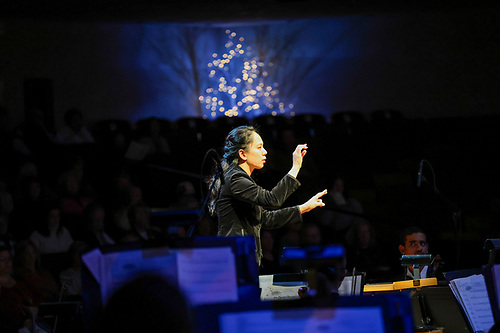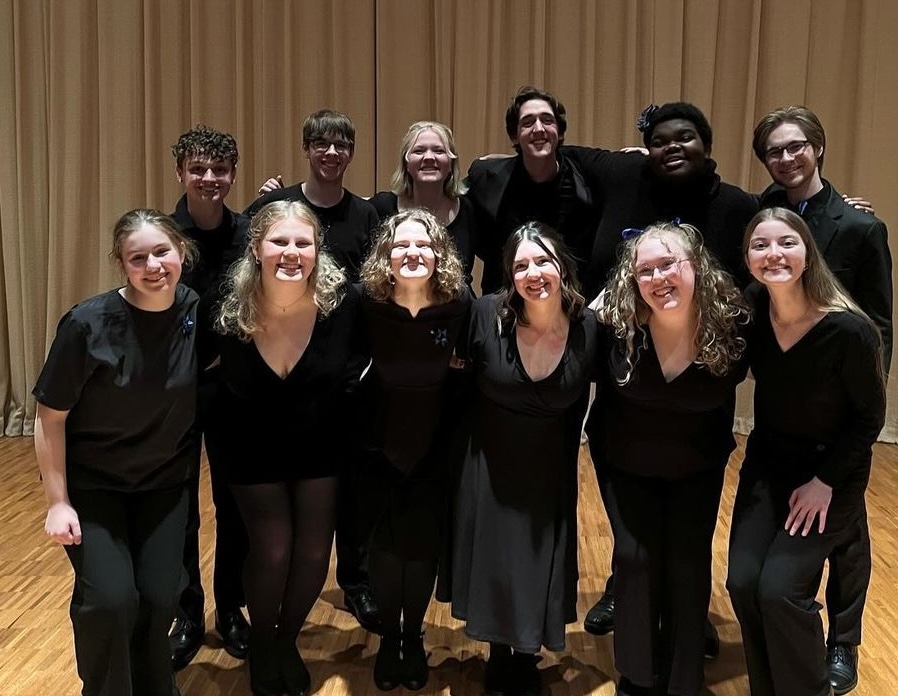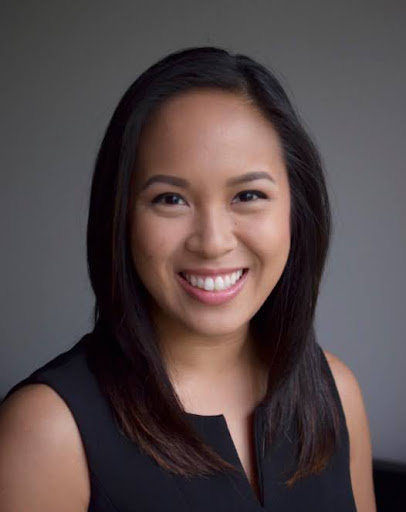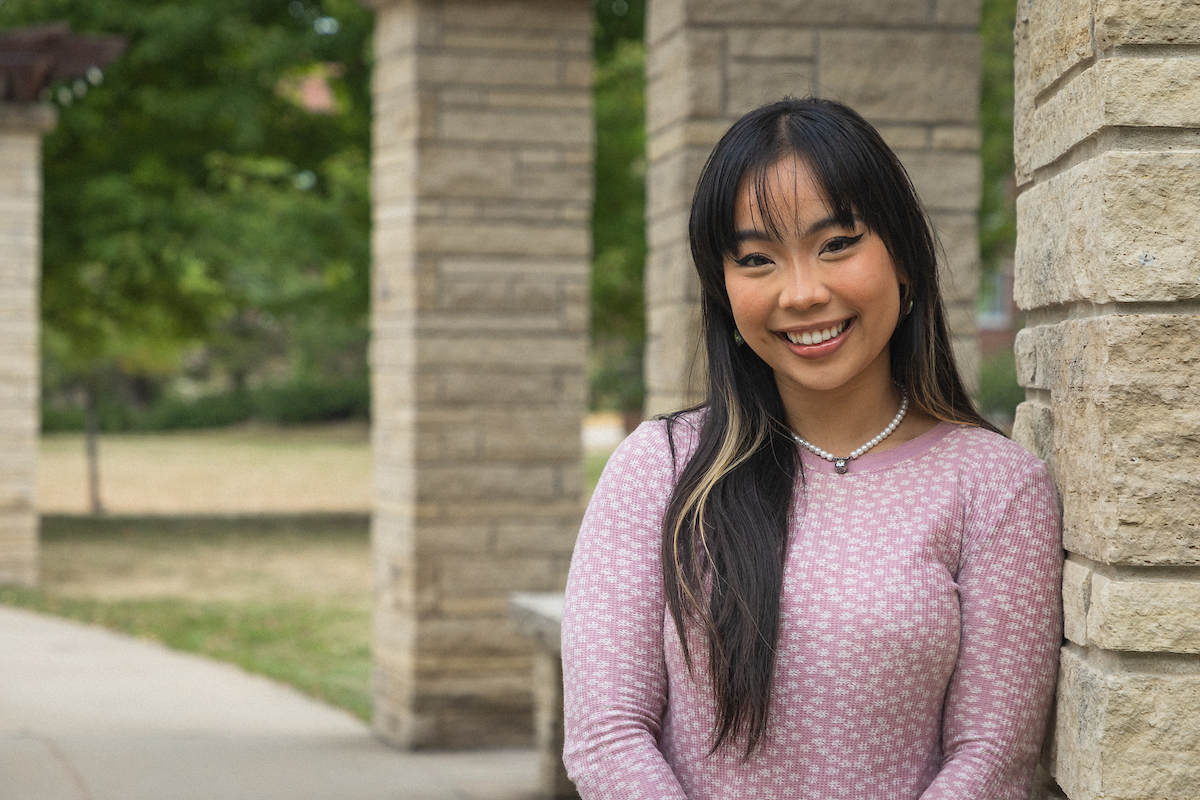When a visitor walks into a Collegiate Chorale rehearsal, they usually introduce themselves to the group. Then, they get asked the question, “If you were a vending machine, what would you vend?” The question produces a wide variety of answers from specific beauty products, to a favorite drink, to abstract ideas of what makes a person happy, to a delicious snack. Assistant Professor of Music and Director of Collegiate Chorale and Aurora Adrianna Tam answers simply: love.
“I would want to be able to vend people love, self-esteem, confidence and compassion,” Tam said.
This lays the basis for Tam’s approach to community music-making and the way that she runs the choral classroom. Her style of conducting and teaching has come from years of experience and education. Her education began with an undergraduate degree in music from the Massachusetts Institute of Technology (MIT), a Master of Music in Choral Conducting at Yale University, a Master of Arts in Choral Conducting at Universität für Musik und darstellende Kunst Graz in Austria and a Doctorate of Musical Arts in Choral Conducting from the University of Michigan. She has conducted groups in the United States, Germany, Switzerland, Canada, Austria and Taiwan.
Tam comes to the profession through a strong familial background in music. Her mother Jing Ling-Tam is an internationally renowned choral conductor. However, Tam did not always know that she wanted to pursue music. Tam went to MIT with the intention of pursuing a track in pre-medicine, and she tried biology, political science and architecture along the way.
“I saw myself, in my free time, doing musical things,” Tam said. “I would sit at the piano and just noodle around. I chose my dorm because I knew it had the most pianos. I was singing in choir, I was playing in orchestra and I joined an acapella group. I thought about writing songs, and as much as I do enjoy thinking about the way things are built, molecules and chemical reactions, it doesn’t engage my passion in the way that music and community do. I think I tried to do something ‘practical’ that would solve the problems of the world.”
Two years into her undergraduate degree, Tam decided that music was something that she wanted to pursue. However, despite years in the field and many years of postgraduate study, Tam did not feel justified in her musical pursuits until she reached Luther.
“Coming to Luther was the first time I felt confirmed [in my] calling,” Tam said. “Getting up in front of Aurora and Collegiate [Choral] my first semester [was] like, ‘Wow, I feel like I’m doing what I was made to do. I’m not doing it perfectly. I’m getting better, but wow, how lucky am I to do this.’”
Though Tam feels supported on campus, the journey to Luther and adjustment to living in the rural Midwest has had some ups and downs. Tam recalls driving up Highway 52, toward the Twin Cities, on her way back from her interview and noted the experience of seeing large signs along the highway. These billboards, right outside of Chatfield, Minnesota, vocally support Donald Trump and his platform. The property owner regularly changes the message of the signs, but they often are covered in hate speech towards minority groups and the Democratic party.
“One of the signs said something like ‘black guns matter’ and ‘Thanks for the Kung Flu China,’” Tam said. “That struck a note of fear in me; Is this what people might say to me? Even walking down Water Street with my dad and walking by Club 45, those signs were also really frightening. [This] is not just in the Midwest, but [it] has been a difficult thing to see frequently in close proximity [while] living in Decorah.”
As an Asian-American woman in the rural Midwest, Tam is acutely aware of the barriers that she has to face and overcome. Within the music world, it is not uncommon to find Asian-American musicians and conductors, but within Luther’s music department, she is currently the only female ensemble conductor and one of only two non-white ensemble conductors. Tam spoke to the pressure that she felt upon her arrival to Luther.
“Students saw me and were hopeful that I was a sign of some positive change towards diversification in general,” Tam said. “It also has been challenging to feel that I do too much or that I can’t do enough. The first one, it’s that sometimes I face forms of backlash for some things I advocate for, in terms of [diversity, equity and inclusion]. On the other hand, sometimes I feel like I’m not doing enough, like I have failed to properly introduce the piece without giving it the context that [the choir] needs in order to feel ready to perform something that is not in the canon. That has been a personal struggle for me, as an Asian American, non-white person in this department.”
Tam is known for her diverse and wide-ranging choral repertoire selections and the intentional inclusion of a variety of composers and texts from outside the choral canon. She programs anything from Bach to foreign language text settings of traditional folk songs. Although she grew up as a Christian, Tam programs a wide variety of sacred and secular music that aligns with the College Ministries mission of faith rooted in the Lutheran tradition yet open to the experience and beauty of other religious practices.
Anna Tauscher (‘26), a singer in Collegiate Chorale, values the experience of singing in a choir with Tam.
“It is clear from her rehearsal style that she respects her students as musicians and values their input,” Tauscher said. “She is always willing to answer questions and makes time for us to discuss what the music means to us and how we want to convey that message to an audience. It makes the whole atmosphere of her rehearsal incredibly inviting and something special to be a part of.”
Tam emphasizes the importance of community music-making within the choral rehearsal and out in the Decorah community. Her choirs regularly sing at chapel on campus, church services in town and for people living in assisted living and nursing facilities in Decorah. She often brings hymns for elderly residents to sing along with her choirs and encourages her students to strike up conversations with the people that they sing for.
“Music is important because I think it’s always going to be around,” Tam said. “People are always going to hum and sing — whether that’s patriotic songs [or] folk songs. It brings people together. It can bring joy. It can bring comfort. Any professional symphony is going to give you inspiring, excellent music, but to make inspiring, excellent, authentic, bone-chilling music that reaches the audience and the people making the music, that’s enabled by true connection amongst the ensemble through community.






